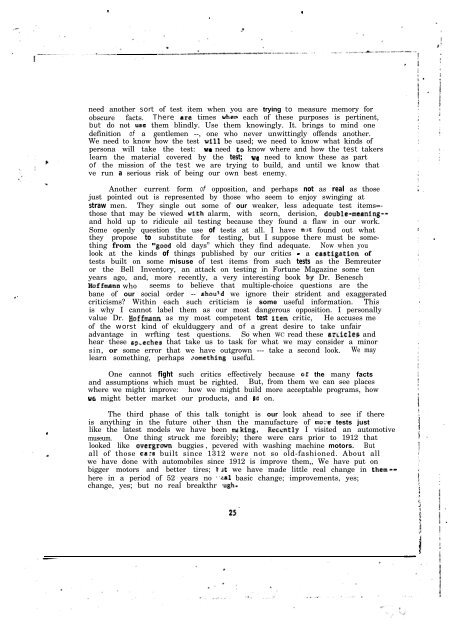Technical Report - International Military Testing Association
Technical Report - International Military Testing Association
Technical Report - International Military Testing Association
Create successful ePaper yourself
Turn your PDF publications into a flip-book with our unique Google optimized e-Paper software.
. .<br />
.<br />
. .<br />
.<br />
need another sort of test item when you are trying to measure memory for<br />
obscure facts. There ar,e times wher each of these purposes is pertinent,<br />
but do not USC them blindly. Use them knowingly. It. brings to mind one<br />
definition of a gentlemen --, one who never unwittingly offends another.<br />
We need to know how the test vi11 be used; we need to know what kinds of<br />
persona will take the test: ve need .to know where and how the test takers<br />
learn the material covered by the test; ve need to know these as part<br />
of the mission of the test we are trying to build, and until we know that<br />
ve run a serious risk of being our own best enemy.<br />
Another current form of opposition, and perhaps not as real as those<br />
just pointed out is represented by those who seem to enjoy swinging at<br />
straw men. They single out some of our weaker, less adequate test items=those<br />
that may be viewed with alarm, with scorn, derision, double-meanlng-and<br />
hold up to ridicule ail testing because they found a flaw in our work.<br />
Some openly question the use of tests at all. I have n.>lt found out what<br />
they propose to substitute for testing, but I suppose there must be something<br />
from the “good old days” which they find adequate. Now when you<br />
look at the kinds of things published by our critics - a castfgation of<br />
tests built on some misuse of test items from such tests as the Bemreuter<br />
or the Bell Inventory, an attack on testing in Fortune Magazine some ten<br />
years ago, and, more recently, a very interesting book b:y Dr. Benesch<br />
Hoffmann who seems to believe that multiple-choice questions are the<br />
bane of our social order -- should we ignore their strident and exaggerated<br />
criticisms? Within each such criticism is some useful information. This<br />
is why I cannot label them as our most dangerous opposition. I personally<br />
value Dr. Hoffmann as my most competent test item critic, He accuses me<br />
of the worst kind of ekulduggery and of a great desire to take unfair<br />
advantage in wrfting test questions. So when WC read these articles and<br />
hear these sp,eches that take us to task for what we may consider a minor<br />
sin, or some error that we have outgrown --- take a second look. We may<br />
learn something, perhaps ,comething useful.<br />
One cannot fight such critics effectively because o.f the many facts<br />
and assumptions which must be righted. But, from them we can see places<br />
where we might improve: how we might build more acceptable programs, how<br />
we might better market our products, and SO on.<br />
The third phase of this talk tonight is our look ahead to see if there<br />
is anything in the future other thsn the manufacture of more tests just<br />
like the latest models we have been nr.king. Recently I visited an automotive<br />
museum. One thing struck me forcibly; there were cars prior to 1912 that<br />
looked like overgrown buggies , pcvered with washing machine motors. But<br />
all of those ca:s built since 1312 were not so old-fashioned. About all<br />
we have done with automobiles since 1912 is improve them,, We have put on<br />
bigger motors and better tires; FJt we have made little real change in them-a<br />
here in a period of 52 years no ,.&al basic change; improvements, yes;<br />
change, yes; but no real breakthr *ugh-<br />
25.









